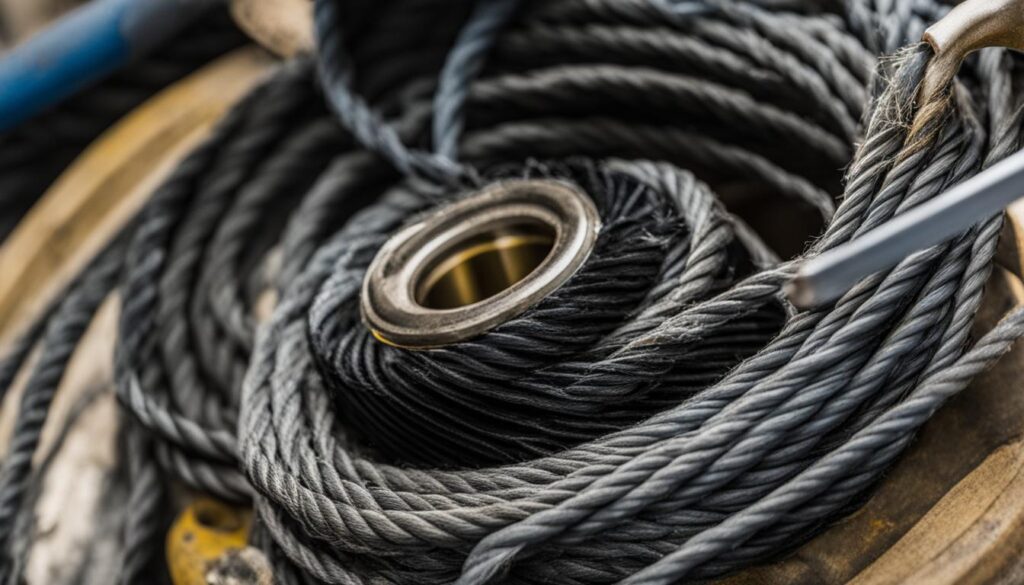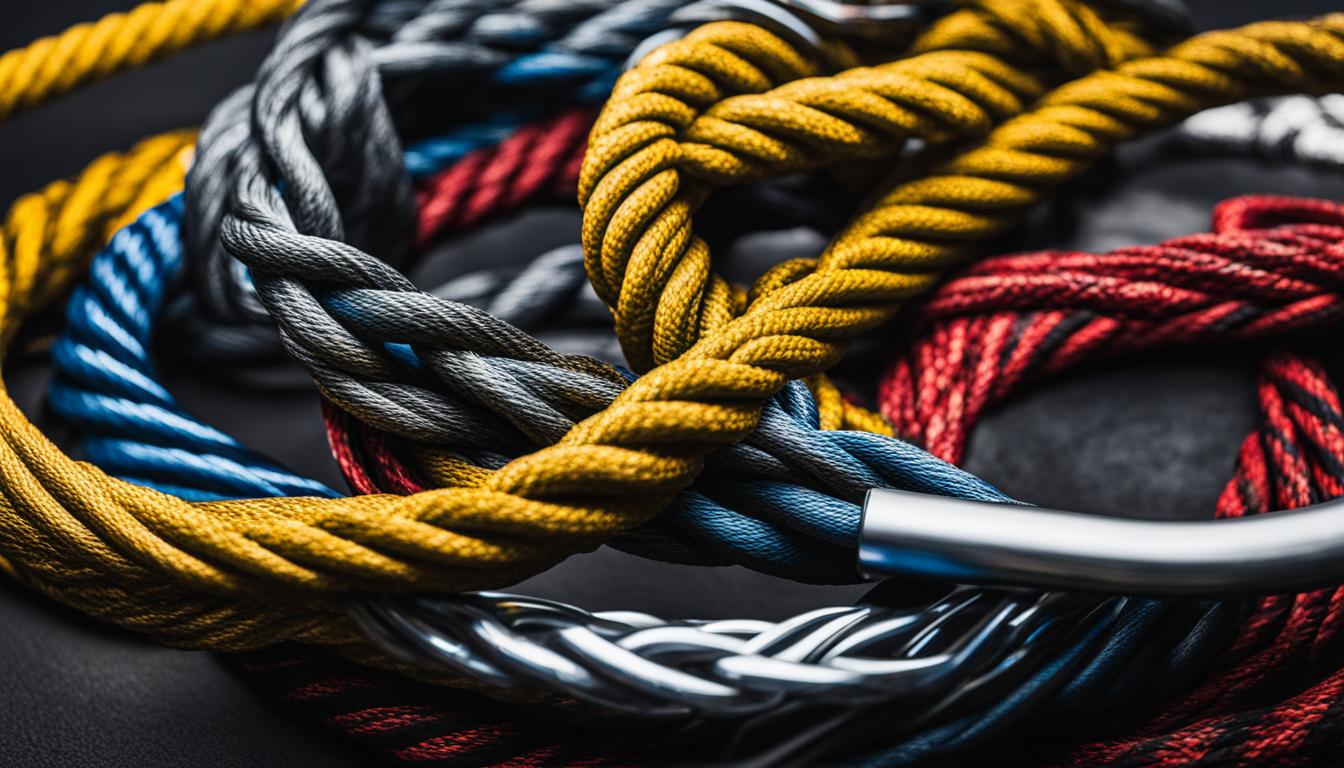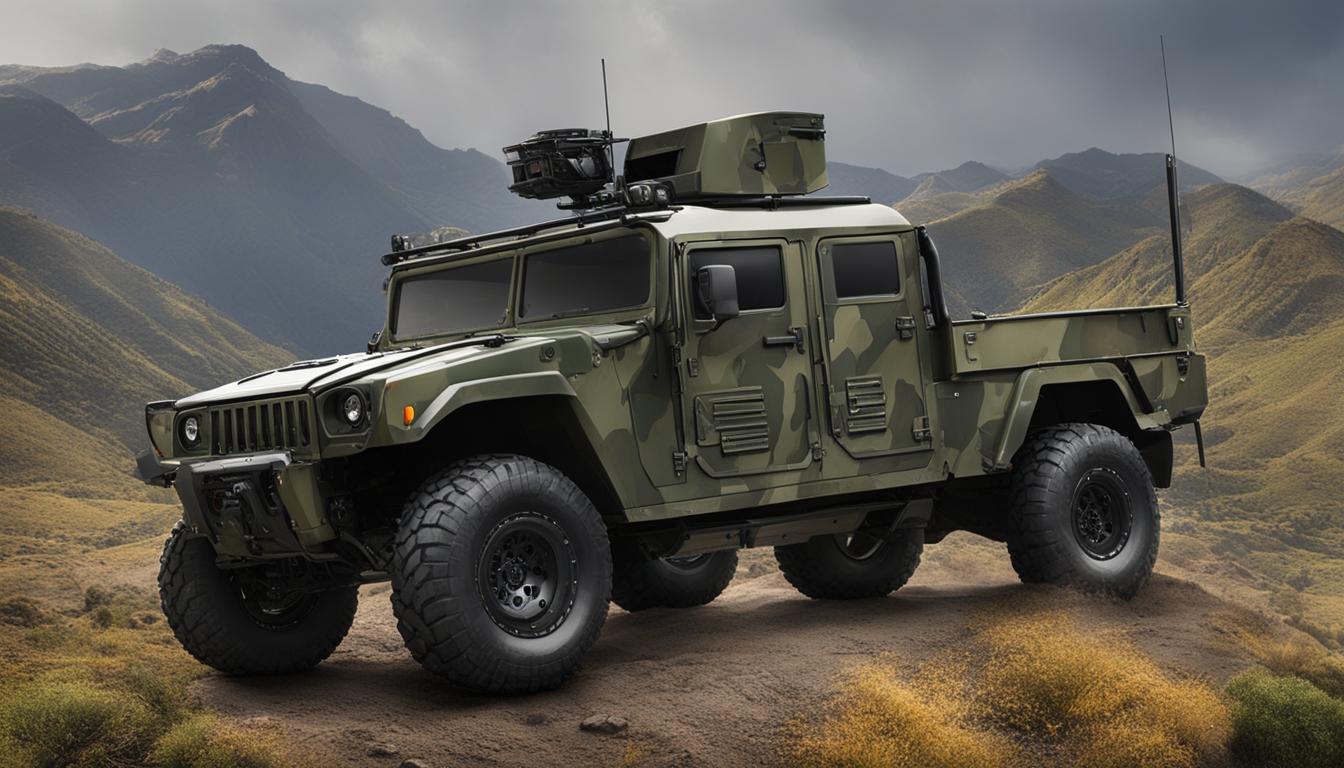When it comes to winching, there are two common choices: synthetic winch ropes and steel winch ropes. Each type has its own unique characteristics and advantages. In this article, we will explore the difference between synthetic and steel winch ropes, helping you understand which option may be best suited for your needs.
Before diving into the details, it’s important to note that synthetic winch ropes are made from hi-tech polyethylene and are significantly lighter than steel cables. On the other hand, steel winch ropes are more durable and affordable. Now, let’s take a closer look at the specific differences between the two.
Key Takeaways:
- Synthetic winch ropes are lighter and easier to handle.
- Steel winch ropes are more durable and affordable.
- Synthetic ropes have a higher breaking strength.
- Steel cables are prone to rusting and developing burrs.
- The choice between synthetic and steel winch ropes depends on personal preferences and specific needs.
Durability and Strength
Synthetic winch ropes and steel winch ropes differ in terms of durability and strength. Steel winch ropes are highly durable and resistant to fraying and abrading, making them well-suited for use in tough and abrasive terrains such as mud, rocks, and sand. They can withstand heavy loads and rough handling without compromising their strength. However, steel cables are prone to rusting over time and can develop sharp burrs, which can pose safety risks and potentially damage the winch drum.
Synthetic winch ropes, on the other hand, are lightweight yet strong. They have a higher breaking strength compared to steel cables and are less likely to develop burrs, making them safer to handle. However, they are susceptible to UV exposure, heat, chemicals, and abrasion. These factors can gradually weaken the rope’s integrity and reduce its overall durability. Regular inspection and maintenance are necessary to ensure the synthetic winch rope remains in optimal condition and able to withstand demanding winching tasks.
Comparing Durability and Strength
| Factors | Synthetic Winch Ropes | Steel Winch Ropes |
|---|---|---|
| Durability | Less durable, susceptible to UV exposure, heat, chemicals, and abrasion | Highly durable, resistant to fraying and abrading, but prone to rusting over time |
| Strength | Higher breaking strength | Can withstand heavy loads and rough handling |
| Safety | Less likely to develop sharp burrs, safer to handle | Prone to rusting and sharp burrs, which can pose safety risks |
Ease of Use
When it comes to ease of use, synthetic winch ropes have several benefits over steel cables. Firstly, they are significantly lighter, making them easier to handle and maneuver during winching operations. This lightweight nature also reduces the strain on the winch itself, resulting in improved performance and longevity.
Another advantage of synthetic ropes is their flexibility. They can be easily spooled up on the drum without kinking or tangling, ensuring smooth and efficient operation. In contrast, steel winch ropes are heavier and can be more challenging to handle, especially when it comes to spooling and unspooling.
Additionally, synthetic ropes do not develop sharp burrs like steel cables, making them safer to handle without the need for gloves. This eliminates the risk of cuts and injuries during winching operations. On the other hand, steel cables have a higher tendency to develop burrs over time, requiring extra caution during handling and maintenance.
| Benefits of Synthetic Winch Ropes | Characteristics of Steel Winch Ropes |
|---|---|
|
|
Safety Considerations
When it comes to winching, safety is of utmost importance. Both synthetic winch ropes and steel winch ropes have their own set of pros and cons in terms of safety considerations.
Advantages of Synthetic Winch Ropes
Synthetic winch ropes offer several safety advantages over steel cables. One of the main benefits is their lightweight nature. In the event of a rope break, synthetic ropes pose less risk of causing severe injuries compared to heavier steel cables. The reduced weight means that there is less force flying through the air, minimizing the potential for accidents.
Another safety advantage of synthetic winch ropes is that they do not develop sharp burrs like steel cables. This eliminates the risk of cuts and injuries when handling the rope without gloves. Synthetic ropes are also typically easier to handle due to their flexibility and lower weight.
“Synthetic winch ropes provide a safer winching experience due to their lightweight nature and absence of sharp burrs.” – Expert Winch Roper
Advantages of Steel Winch Ropes
While synthetic winch ropes have their safety advantages, steel cables also offer certain benefits. One of the main advantages of steel winch ropes is their durability. Steel cables are less prone to breaking under load, making them a reliable option in high-stress situations.
Additionally, steel winch ropes are more durable in highly abrasive terrains. They can withstand dragging over rocks, mud, and sand without worrying about wear and tear. This durability can increase safety by reducing the risk of the rope breaking or fraying in harsh conditions.
“Steel winch ropes provide enhanced safety in abrasive terrains and high-stress situations.” – Off-Road Enthusiast
| Pros of Synthetic Winch Ropes | Pros of Steel Winch Ropes |
|---|---|
| Lightweight | Durable |
| No sharp burrs | Resistant to high-stress situations |
| Easy to handle | Reliable in abrasive terrains |
Maintenance Requirements
When it comes to winch ropes, both synthetic and steel options require regular maintenance to ensure optimal performance and longevity. However, the specific maintenance requirements differ between the two types of ropes.
Maintenance for Synthetic Winch Ropes
Synthetic winch ropes, made from hi-tech polyethylene, offer several advantages such as light weight and flexibility. But they also require more maintenance compared to steel cables. One of the key maintenance tasks for synthetic ropes is regular cleaning to remove dirt and debris that can weaken the rope. Additionally, it’s important to dry the rope thoroughly after use, especially if it has been exposed to water or used in muddy conditions.
As synthetic ropes can hold water, it’s crucial to ensure they are completely dry before storage to prevent damage. If the rope is not dried properly, it can add weight and even freeze in cold weather conditions.
Maintenance for Steel Winch Ropes
Steel winch cables, while requiring less maintenance than synthetic ropes, still need regular attention to ensure optimal performance and safety. One of the essential maintenance tasks for steel cables is inspecting them regularly for rusting and sharp burrs. If any rust or corrosion is found, it should be dealt with promptly to prevent further damage to the cable.
Additionally, steel cables should be greased regularly to prevent rust buildup and ensure smooth operation. This maintenance step helps to prolong the lifespan of the cable by reducing friction and preventing rust-related damage.
| Winch Rope Type | Maintenance Requirements |
|---|---|
| Synthetic Winch Ropes | Regular cleaning to remove dirt and debris. Thorough drying after each use. Protection from UV exposure, heat, and abrasion. |
| Steel Winch Ropes | Regular inspection for rusting and sharp burrs. Greasing to prevent rust buildup. Protection from UV exposure and abrasion. |
By understanding and following the specific maintenance requirements for synthetic and steel winch ropes, users can ensure that their ropes remain in optimal condition and perform reliably when needed.
Synthetic and Steel Winch Rope Handling
When it comes to handling different conditions, both synthetic and steel winch ropes have their advantages and considerations. Synthetic winch ropes excel in certain situations, thanks to their lightweight and flexible nature. These ropes are easier to handle and maneuver, making them suitable for various recovery scenarios. They also float, making them ideal for water recoveries. However, it’s important to note that synthetic ropes are prone to UV exposure, heat, chemicals, and abrasion, which can weaken the rope over time.
On the other hand, steel winch cables are heavier and may require more effort to handle. However, they are highly durable and can withstand rough handling in abrasive terrains. Steel ropes are less likely to suffer from wear and tear, making them a preferred choice for heavy-duty applications. It’s important to take precautions when handling steel winch ropes, such as wearing gloves to protect against sharp burrs. Regular maintenance, including inspection and greasing, is also necessary to prevent rusting. Overall, steel winch ropes offer reliability in challenging conditions.
In summary, synthetic winch ropes are advantageous in terms of their lightweight and flexibility, making them easier to handle and suitable for various situations. However, they require careful maintenance and are susceptible to certain environmental factors. On the other hand, steel winch ropes are more durable and can withstand rough handling, making them a preferred choice for heavy-duty applications. Both types of ropes have their own considerations, and the choice depends on the specific needs and preferences of the user.
Limitations and Drawbacks
While synthetic winch ropes offer several benefits, they also have limitations that should be considered. One of the main drawbacks is their susceptibility to UV exposure, heat, chemicals, and abrasion. These factors can weaken the rope over time, reducing its overall strength and durability. Regular cleaning and drying are essential to prevent damage and prolong the lifespan of synthetic ropes.
Another limitation of synthetic winch ropes is the need for regular maintenance. They can hold water, which adds weight and can freeze in cold weather conditions. This not only affects the performance of the rope but also increases the risk of damage during winching operations. Therefore, users must dedicate time and effort to keep synthetic ropes in optimal condition.
On the other hand, steel winch ropes also have their own set of drawbacks. One of the main concerns is the weight of steel cables. They are significantly heavier than synthetic ropes, which can make handling and spooling more challenging. Additionally, steel cables are prone to developing sharp burrs, which can pose a safety risk during operation. Regular inspections and wearing gloves are necessary precautions when using steel winch ropes.
| Limitations of Synthetic Winch Ropes | Drawbacks of Steel Winch Ropes |
|---|---|
| Susceptible to UV exposure, heat, chemicals, and abrasion | Significantly heavier than synthetic ropes |
| Require regular cleaning and drying | Proneness to developing sharp burrs |
| Can hold water and freeze in cold weather | Regular inspections and wearing gloves necessary |
It’s important to consider these limitations and drawbacks when choosing between synthetic and steel winch ropes. Each option has its own advantages and disadvantages, and the decision ultimately depends on personal preferences and the specific needs of the winching operation. Proper maintenance and care are vital for the longevity and reliable performance of both types of ropes.
Choosing the Right Rope for Your Needs
When it comes to winch ropes, choosing the right one for your needs is essential. Both synthetic and steel winch ropes have their own advantages and drawbacks, so it’s important to consider several factors before making a decision.
One of the main factors to consider is the specific terrain and conditions in which you will be using the winch rope. Synthetic ropes are ideal for situations where weight, flexibility, and safety are crucial. They are lighter and more flexible than steel cables, making them easier to handle and spool up on the drum properly. Synthetic ropes are also safer to handle without gloves, as they don’t develop burrs like steel cables. On the other hand, steel cables are more durable and are the preferred choice for highly abrasive terrains such as mud, rocks, and sand. They can tolerate rough handling without damage and are less prone to breaking under load.
Another factor to consider is the frequency of use and the level of maintenance that can be dedicated to the rope. Synthetic ropes require more maintenance compared to steel cables. They can hold water, which adds weight and can freeze in cold weather. Regular cleaning and drying are essential to prevent damage to the rope. On the other hand, steel winch cables require less maintenance but should still be inspected and greased regularly to prevent rusting and the development of sharp burrs.
Ultimately, the choice between synthetic and steel winch ropes comes down to personal preferences and the specific requirements of the user. To make an informed decision, consider the terrain, frequency of use, level of maintenance, and prioritize factors such as weight, flexibility, durability, and safety. By assessing these factors, you can choose the right winch rope that will meet your needs and ensure successful winching in various conditions.
Factors to Consider in Winch Rope Selection
|
Synthetic Winch Ropes
|
Steel Winch Ropes
|
Recommended Winch Rope Accessories
Both synthetic and steel winch ropes can benefit from certain accessories that enhance their performance and prolong their lifespan. When using a synthetic winch rope, it is recommended to invest in a protective sleeve designed to prevent damage from UV exposure, heat, chemicals, and abrasion. This sleeve acts as a shield, offering an extra layer of protection for the rope, especially in harsh environmental conditions. By using a winch rope protective sleeve, you can ensure that your synthetic rope remains in optimal condition for longer periods.
Additionally, a winch line cover is highly recommended for both synthetic and steel winch ropes. This cover serves as a barrier against the elements, such as rain, snow, and debris, preventing them from causing damage and reducing the overall lifespan of the rope. By using a winch line cover, you can protect your winch rope from environmental factors and ensure its longevity.
It is important to note that when selecting accessories for your winch rope, you should choose high-quality products that are specifically designed for the type of rope you are using. This will ensure optimal performance and protection for your winch rope, allowing you to tackle challenging terrains and situations with confidence.
Advantages of Winch Rope Accessories
“Winch rope accessories, such as protective sleeves and line covers, offer several advantages. They provide an additional layer of protection, shielding the rope from UV exposure, heat, chemicals, and abrasion. This helps to prolong the lifespan of the rope and ensure its durability in challenging conditions. Furthermore, these accessories can also help to prevent the rope from becoming entangled or damaged by debris, enhancing its overall performance and reliability. By investing in winch rope accessories, users can maximize the lifespan of their winch ropes and minimize the risk of costly repairs or replacements.”
Table: Comparison of Winch Rope Accessories
| Accessory | Synthetic Winch Rope Protective Sleeve | Winch Line Cover |
|---|---|---|
| Function | Protects the synthetic winch rope from UV exposure, heat, chemicals, and abrasion | Acts as a barrier against environmental elements such as rain, snow, and debris |
| Benefits | – Prolongs the lifespan of the winch rope – Prevents damage and wear from environmental factors – Enhances durability in harsh conditions |
– Protects the winch rope from the elements – Minimizes the risk of damage and debris entanglement – Extends the overall lifespan of the winch rope |
| Compatibility | Designed specifically for synthetic winch ropes | Suitable for use with both synthetic and steel winch ropes |
| Installation | Easy to install, typically slides over the winch rope | Simple installation process, covers the entire length of the winch rope |
| Price | Varies depending on the brand and quality | Varies depending on the brand and quality |
Table: Comparison of Winch Rope Accessories
Maintenance Tips for Winch Ropes
Proper maintenance is essential for both synthetic and steel winch ropes to ensure their longevity and reliable performance. Here are some maintenance tips to help you keep your winch ropes in top condition:
- Cleaning: After each use, it’s important to clean your winch rope to remove any dirt, mud, or other debris that may have accumulated. Use a mild soap, water, and a soft brush to gently scrub the rope, paying extra attention to any areas that may have been exposed to abrasive conditions.
- Drying: Once the rope is clean, it’s crucial to thoroughly dry it before storing it away. Moisture can weaken the fibers and lead to mold or mildew growth. Hang the rope in a well-ventilated area or use a fan to speed up the drying process.
- Inspect Regularly: Take the time to inspect your winch rope regularly for any signs of damage or wear. Look for frayed or broken fibers, cuts, or abrasions. If you notice any damage, it’s important to replace the rope before using it again.
- Grease Steel Cables: If you have a steel winch rope, make sure to regularly grease it to prevent rusting and the development of sharp burrs. Apply a lubricant specifically designed for steel cables and follow the manufacturer’s instructions for proper application.
By following these maintenance tips, you can ensure that your winch ropes remain in optimal condition, ready to assist you in your future winching endeavors.

Additional Tips for Winch Rope Care
In addition to the general maintenance tips mentioned above, here are a few extra tips to keep in mind:
- Store Properly: When not in use, store your winch rope in a clean, dry, and well-ventilated area. Avoid exposure to direct sunlight, extreme temperatures, and moisture. Using a rope bag or a storage reel can help protect the rope and keep it organized.
- Use Protective Accessories: Consider using protective accessories such as anti-abrasion sleeves, heat sleeves, or winch line covers. These accessories can provide an additional layer of protection against UV exposure, heat, chemicals, and abrasion, prolonging the lifespan of your winch rope.
- Follow Manufacturer’s Guidelines: Always follow the manufacturer’s guidelines for maintenance and care specific to your winch rope. Different ropes may have different requirements, so it’s important to consult the manufacturer’s instructions for the best results.
By implementing these maintenance tips and taking proper care of your winch ropes, you can ensure their reliability and maximize their lifespan, allowing you to tackle challenging terrains and recoveries with confidence.
Conclusion
After comparing the characteristics and features of synthetic and steel winch ropes, it is clear that both options have their own advantages and limitations. Synthetic ropes, made from hi-tech polyethylene, offer a lightweight and flexible solution with a higher breaking strength. They are easier to handle and do not develop burrs like steel cables. However, they are susceptible to UV exposure, heat, chemicals, and abrasion. On the other hand, steel winch cables are more durable and affordable, making them suitable for abrasive terrains. They are less prone to rusting but can be heavy and develop sharp burrs.
Consideration should be given to the specific needs and preferences of the user when choosing between synthetic and steel winch ropes. Synthetic ropes are ideal for situations where weight, flexibility, and safety are crucial. They provide a reliable solution for various applications and terrains. However, regular maintenance is necessary to ensure their longevity and performance. On the other hand, steel cables are preferred in highly abrasive terrains and when durability is a top priority. They require less maintenance but should still be inspected and greased regularly to prevent rusting and the development of sharp burrs.
In conclusion, the choice between synthetic and steel winch ropes ultimately depends on personal preferences, specific application needs, and the level of maintenance one is willing to dedicate to the rope. By carefully considering the factors discussed throughout this article, users can make an informed decision and select the winch rope that best suits their requirements. Whether opting for the lightweight and flexible nature of synthetic ropes or the durability of steel cables, both options offer valuable solutions for winching purposes.
FAQ
What are the differences between synthetic and steel winch ropes?
Synthetic ropes are made from hi-tech polyethylene and are significantly lighter than steel cables. They have a higher breaking strength and are easier to handle, with no risk of developing burrs. Steel cables, on the other hand, are more durable and affordable but are heavier and prone to rusting and developing sharp burrs.
Which type of winch rope is more durable?
Steel winch ropes are known for their durability and strength. They are more resistant to fraying and abrading, making them ideal for use in highly abrasive terrains such as mud, rocks, and sand. However, they are prone to rusting and developing sharp burrs.
What are the benefits of synthetic winch ropes?
Synthetic winch ropes are lightweight and flexible, making them easier to handle. They have a higher breaking strength than steel cables and do not develop burrs, making them safer to handle without gloves.
Are synthetic winch ropes safer than steel cables?
Yes, synthetic winch ropes have safety advantages over steel cables. They are lightweight, so if they break, there is less force flying through the air, reducing the risk of injury. They also don’t develop sharp burrs like steel cables, making them safer to handle.
Do synthetic winch ropes require more maintenance?
Yes, synthetic winch ropes require more maintenance compared to steel cables. They can hold water, which adds weight and can freeze in cold weather. Regular cleaning and drying are essential to prevent damage to the rope.
Can synthetic winch ropes be used in water recoveries?
Yes, synthetic winch ropes float, making them suitable for water recoveries. Their flexibility and low weight make them easier to handle in various situations.
What are the limitations of synthetic winch ropes?
Synthetic winch ropes are susceptible to UV exposure, heat, chemicals, and abrasion, which can weaken the rope over time. They also require regular cleaning and drying to prevent damage.
How do I choose the right winch rope for my needs?
When choosing between synthetic and steel winch ropes, consider factors such as terrain conditions, frequency of use, and maintenance requirements. Synthetic ropes are ideal for situations where weight, flexibility, and safety are crucial, while steel cables are preferable for highly abrasive terrains and when durability is a top priority.
What accessories are recommended for winch ropes?
Synthetic winch ropes often come with a protective anti-abrasion sleeve to prevent damage. Additional heat sleeves or heat-resistant materials can be used to protect the portion of the synthetic rope that wraps around the drum brake. Winch line covers are recommended for both synthetic and steel ropes to protect them from the elements and prolong their lifespan.
How do I properly maintain winch ropes?
Synthetic winch ropes should be regularly cleaned and dried to remove dirt and moisture. Steel cables should be inspected for rusting and sharp burrs and should be greased to prevent rust buildup.
What is the conclusion regarding the difference between synthetic and steel winch ropes?
The choice between synthetic and steel winch ropes depends on factors such as durability, ease of use, maintenance requirements, and specific application needs. Synthetic ropes offer advantages in terms of weight, flexibility, and safety but require regular maintenance and are susceptible to certain environmental factors. Steel cables are more durable and require less maintenance but can be heavier and develop sharp burrs. The ultimate choice should be based on personal preferences, terrain conditions, and maintenance considerations.
 Skip to main content
Skip to main content


